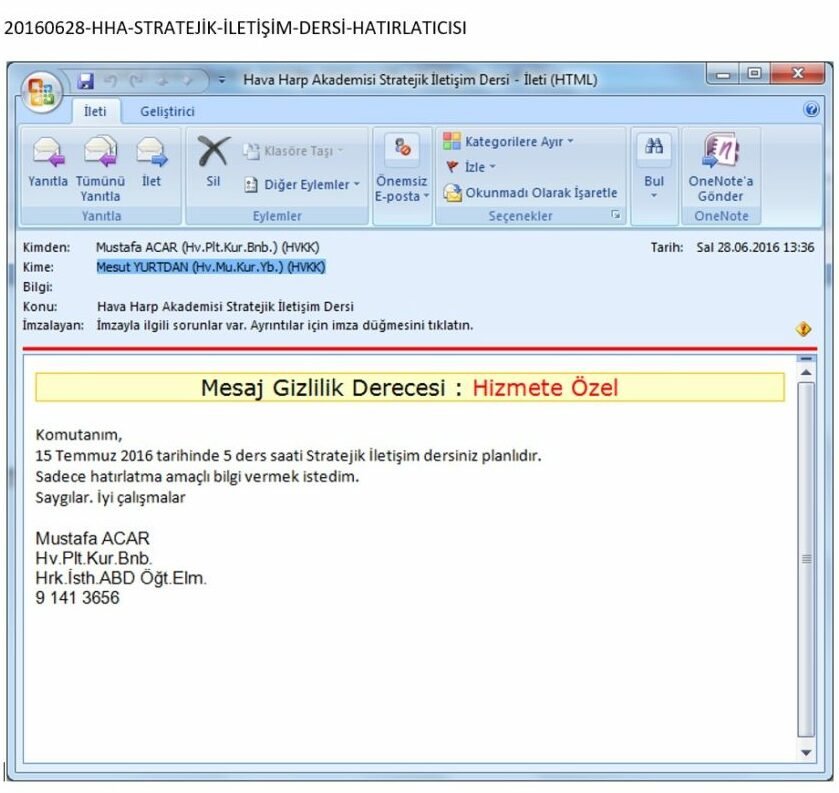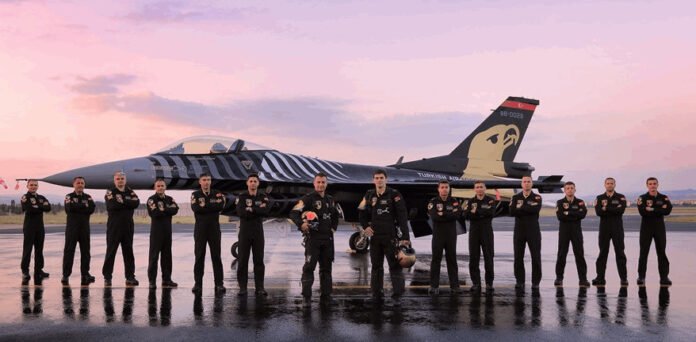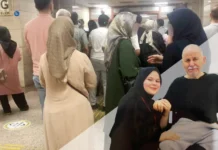A Turkish Air Force lieutenant colonel who had worked as an advisor and press officer at Allied Joint Force Command Lisbon, one of NATO’s three operational level headquarters, was tortured and sentenced to life in prison on bogus charges, documents obtained by Nordic Monitor have revealed.
Mesut Yurtdan, a 45-year-old officer who served with distinction at NATO and in the Turkish Armed Forces (TSK), talked about the terrible ordeal he endured at the hands of thugs at an unofficial detention site in Ankara in the aftermath of a putschist attempt in 2016.
Testifying at the Ankara 4th High Criminal Court on March 20, 2018, Yurtdan provided details of the torture and abuse he and many other detainees were subjected to by the police, under a policy of impunity for perpetrators of such crimes.
“For 10 days, I was subjected to very systematic, deliberate torture by unscrupulous people who said, ‘God is not here, we are here’,” recalled Yurtdan, who was beaten with a baton, forced to stay in a stress position for hours and denied food, water and access to bathroom facilities. He remembered losing feeling in his joints from the long torture sessions. The police also forced privates to beat him while he was handcuffed from behind.
“I was repeatedly threatened with the raiding of my house and the murder, rape and lynching of my children,” Yurtdan told the panel of judges.
Parts of Mesut Yurtdan’s testimony that revealed torture and abuse:

The torture of hundreds of detainees took place in a sports hall at the Ankara police counterterrorism building, which was turned into an unofficial detention site by Turkish authorities. No access to family or lawyers was allowed for detainees, who were still active duty members of military at the time. No due process was followed and no investigation was launched into torture claims that were documented by medical reports in rare cases.
Yurtdan managed to get his complaints of torture and abuse recorded in only one of several medical reports written by doctors who were under intense pressure and threats to not record marks of abuse during police detention. The report, dated July 20, 2016 and written by a doctor named Mehmet Akif Üstuner, indicated that he had marks of torture on his back and on the right and left sides of his body.
The doctor did not check the box on the form as to whether a suitable environment was provided for the examination or who else was present during it. By law, a doctor needs to be alone with the detainee in a safe environment so an independent medical assessment free from pressure by police can be made.
In the following medical checks, doctors simply wrote there was nothing to add to his first report and claimed that the victim had no complaints, which was not the case.
Yurtdan’s case represents one of numerous torture and abuse incidents that were systematic, deliberate and sanctioned by the government of President Recep Tayyip Erdoğan, which granted police and other government officials blanket immunity from prosecution in such cases.
Rare medical report that documented marks of torture on Mesut Yurtdan:
Yurtdan had nothing to do with the false flag coup attempt on July 15, 2016 that was orchestrated by the Turkish president and his intelligence and military chiefs to create a pretext for the unprecedented purge of nearly all pro-NATO officers from the Turkish military. The vacancies were later staffed by Islamists, nationalists and neo-nationalist group members.
Almost 70 percent of all generals and admirals were removed and nearly 90 percent of all staff officers were purged from NATO’s second largest army in terms of manpower. Many faced prosecution and were sent to jail on dubious charges of terrorism and coup plotting.
Nothing was unusual for Yurtdan in the days and weeks leading up to the July 15 events. His job as a communications officer for the air force had always been busy. He used to get up early in the morning to make it to his office by 5 a.m. to prepare daily press briefings for the commanders. He had a 17-member team that respected him and had good connections with Turkish and foreign journalists who covered military affairs in Turkey.

Yurtdan had a distinguished track record as a specialist in the air force’s Communication, Electronic and Information Systems (Muhabere, Elektronik ve Bilgi Sistemleri, or MEBS), a unit he had served in since his graduation from the military academy. After completing his master’s degree in computer engineering with honors at George Washington University, he was appointed manager of MEBS. In 2010 he was sent to serve at Allied Joint Force Command Lisbon for three years.
Upon his return Yurtdan assumed the position of director of the Communications Bureau at the Air Force General Secretariat, handling all press and communications affairs on behalf of the Air Force Command. He organized promotional campaigns such as Solo Turk, a one-person air show in a fighter jet and the air force’s celebrated aerobatic team, Türk Yıldızları (Turkish Stars).
On the morning of July 15, Yurtdan was in Istanbul delivering a series of lectures on strategic communication at the Air Force Academy. From email communications that were submitted to the court, it was clear that the lecture series had been planned long before. He went Istanbul directly after spending four days on vacation at a military resort in Erdek with his family. When the lectures were over, he called his commanding officer, who asked him to come to Ankara and work over the weekend as part of preparations for Solo Turk’s performance on Monday in the resort province of Antalya on the Mediterranean.
While driving to Ankara with his wife, who was eight months pregnant with her third child, Yurtdan got a call from a first lieutenant in his office who informed him that the Solo Turk event had been canceled by the commanders. He told the lieutenant it would be terrible because as many as 100,000 people including tourists were expected to attend the Turkish performance. “There have been cancelations before, but this is the first time I’ve seen a last-minute cancelation in three years,” he said.
He was later told that the event was back on with the Antalya governor’s support. After dropping his wife and kids off at home, he went to his office to manage the press communications about the on-and-off event. Nothing was out of the ordinary when he entered Air Force Command headquarters at around 21:30. He was exhausted from driving eight hours and spending six hours giving lectures over the last 24 hours.
When he went to check in with the General Secretariat to inquire about the last-minute changes with the Solo Turk event, he was told that there were gunshots coming from General Staff headquarters located across the street and that there could be a terrorist attack. Air Force headquarters had been on a high security alert and the entrances and exits had been blocked. He was told to wait in his office.
Yurtdan recalled the terrorist attack that had taken place six months earlier near his office and thought there was another attack going on. A car bomb attack was carried out on military shuttles in Ankara, killing 29 people and wounding 60, on February 17, 2016. The attack happened in the heart of the Turkish capital, on Merasim Street, near government buildings, military headquarters and the Turkish Parliament. It targeted a convoy of shuttles carrying both civilian and military personnel working at military headquarters during the evening rush hour.
He spent the entire night at headquarters, trying to stay safe from the chaotic events that were unfolding. For a while, he went to the Security Operations Center, which was equipped with surveillance cameras around the base and looked at the screens to make some sense of what was happening across the street.
Air force commander Gen. Abidin Ünal came to the headquarters towards evening on July 16, and Yurtdan was summoned to coordinate a press statement and distribute it to media outlets.
On July 17 Yurtdan worked on the details of another news bulletin about what happened with the air force in the chaotic events. He was detained that day on the grounds that his name was on an assignments list prepared by the alleged putschists. He said he had no role whatsoever in preparing such a list, was not informed in advance about the assignment and did not do anything to contribute to the coup attempt. All he had done prior to July 15 was routine work in coordination with his commanding officers.
The plotters, apparently working with outdated data, listed his rank as colonel and misspelled his last name. Similar mistakes were made with other names on the list as well, suggesting that it was not professional military officers but rather elements outside the military with no real experience who had drafted the list of putschists who would be assigned to various positions in the event of a successful coup. There were numerous mistakes in the way the martial law directive was written as well. Yurtdan highlighted these mistakes as proof that he had been framed.
The assignments list also included the names of those who did not receive any assignment, which was bizarre and against the rules in drawing up assignments lists. “Those who are not assigned in the regular assignments list are not displayed, yet we see that this list also includes those who were not [assigned],” Yurtdan pointed out. He also stressed that those who receive new assignments would not remain in their current positions, which was not the case in the putschists’ assignments list, either. The appointments to the position of chief of general staff and force commanders were left empty, which was also quite odd.
Acccording to Yurtdan, this was a plot to purge targeted officers from the Turkish military, and the assignments list was prepared specifically to frame unsuspecting officers. To his surprise, he was appointed to run the state-owned Anadolu news agency, for which he had no experience whatsoever. He had never worked in civilian media before, had no idea he was appointed to such a post on the night of the attempted coup and did not make any move that suggested he was actually trying to take over the news agency building, the location of which was not even known by him.
Despite fabrications and unfounded allegations against him, Yurtdan was sentenced to aggravated life in November 2020. His pleas for justice fell on the deaf ears of the three judges who heard the trial and rejected most motions filed by him to mount an effective defense against the baseless accusations.
















